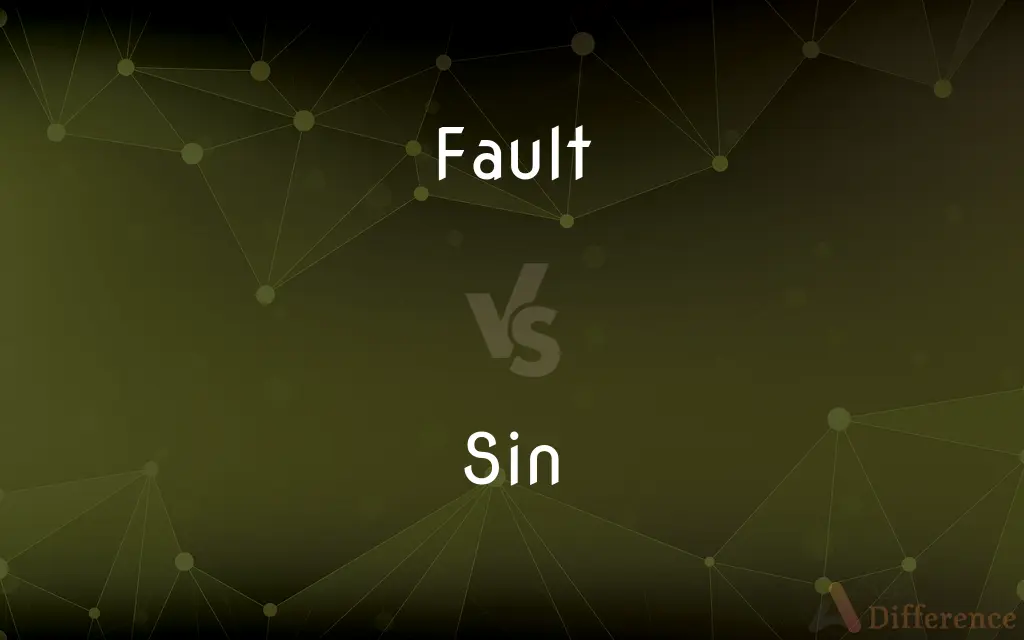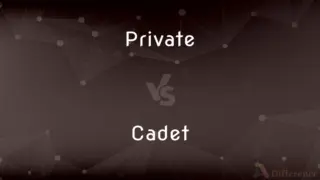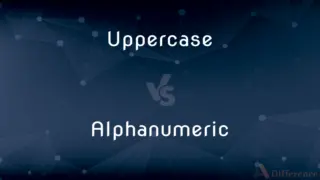Fault vs. Sin — What's the Difference?
By Tayyaba Rehman & Maham Liaqat — Updated on March 28, 2024
A fault is a mistake or flaw in character or action, often viewed from a secular perspective, while sin is a moral wrongdoing seen in the context of religion and ethics, violating divine law.

Difference Between Fault and Sin
Table of Contents
ADVERTISEMENT
Key Differences
Faults can be seen in everyday mistakes or imperfections, highlighting areas where an individual may fall short of personal or societal expectations without necessarily invoking moral condemnation. Sin, however, carries a weightier connotation, often associated with transgressions against divine commandments or moral laws, implicating spiritual and ethical dimensions.
While faults might be addressed through correction, learning, or improvement strategies, sins are typically approached through repentance, forgiveness, and moral rectitude within a religious framework. This distinction underscores the difference in addressing human imperfections in secular versus religious contexts.
Faults are universally acknowledged across cultures as part of the human condition, implying that everyone has areas of weakness or error. Sins, on the other hand, are defined according to specific religious doctrines, and what is considered a sin in one religion may not be viewed as such in another, reflecting varied moral landscapes.
The concept of fault extends beyond personal shortcomings to include errors in judgment, systems, or machinery, often analyzed to prevent future occurrences. Sin, conversely, is inherently tied to personal morality and ethics, emphasizing the individual's relationship with the divine or the moral code of their community.
Comparison Chart
Definition
A mistake or flaw in character or action.
A moral wrongdoing that violates divine or ethical laws.
ADVERTISEMENT
Context
Secular, encompassing personal, social, or technical errors.
Religious or ethical, relating to divine laws or morals.
Approach to Resolution
Correction, learning, improvement.
Repentance, forgiveness, spiritual guidance.
Universality
Recognized across cultures as part of human imperfection.
Defined by specific religious doctrines.
Legal/Social Consequences
May lead to corrective actions or penalties.
Addressed through religious or spiritual practices.
Focus
Can include personal shortcomings, errors in judgment, systems, or machinery.
Personal morality, ethics, and relationship with the divine.
Compare with Definitions
Fault
An error or defect in judgment or action.
Forgetting the appointment was my fault.
Sin
An act against divine law or moral principles.
In many religions, stealing is considered a sin.
Fault
An imperfection in an object or system.
The sculpture had a small fault in its base.
Sin
A violation of religious or moral law.
He sought forgiveness for his sins.
Fault
A weakness or flaw in character.
His impatience is a significant fault.
Sin
A state of being that separates an individual from the divine.
The concept of original sin refers to the inherent sinfulness of humanity.
Fault
A technical or mechanical failure.
The system crash was due to a software fault.
Sin
Something regarded as shameful or wrong.
To him, wasting food was a sin.
Fault
Responsibility for a mistake or wrongdoing.
She took full fault for the oversight.
Sin
In a religious context, sin is a transgression against divine law. Each culture has its own interpretation of what it means to commit a sin.
Fault
A character weakness, especially a minor one.
Sin
An immoral act considered to be a transgression against divine law
The human capacity for sin
A sin in the eyes of God
Fault
Something that impairs or detracts from physical perfection; a defect.
Sin
Commit a sin
I sinned and brought shame down on us
Fault
A mistake; an error
A grammatical fault.
A fault in his reasoning.
Sin
A transgression of a religious or moral law, especially when deliberate.
Fault
A minor offense or misdeed
Committed her share of youthful faults.
Sin
Deliberate disobedience to the known will of God.
Fault
Responsibility for a mistake or an offense; culpability.
Sin
A condition of estrangement from God resulting from such disobedience.
Fault
(Geology) A fracture in the continuity of a rock formation caused by a shifting or dislodging of the earth's crust, in which adjacent surfaces are displaced relative to one another and parallel to the plane of fracture. Also called shift.
Sin
Something regarded as being shameful, deplorable, or utterly wrong.
Fault
(Electronics) A defect in a circuit or wiring caused by imperfect connections, poor insulation, grounding, or shorting.
Sin
One of the two forms of the 21st letter of the Hebrew alphabet, distinguished from the letter shin by having a dot above the left side of the letter. See Table at alphabet.
Fault
(Sports) A service of the ball that violates the rules in tennis and similar games.
Sin
The Babylonian god of the moon.
Fault
(Archaic) A lack or deficiency.
Sin
To violate a religious or moral law.
Fault
To find error or defect in; criticize or blame
Faulted the author for poor research.
Faulted the book for inaccuracies.
Sin
(theology) A violation of God's will or religious law.
As a Christian, I think this is a sin against God.
Fault
(Geology) To produce a fault in; fracture.
Sin
Sinfulness, depravity, iniquity.
Fault
To commit a mistake or an error.
Sin
A misdeed or wrong.
Fault
(Geology) To shift so as to produce a fault.
Sin
A sin offering; a sacrifice for sin.
Fault
(Sports) To commit a fault, as in tennis.
Sin
An embodiment of sin; a very wicked person.
Fault
A defect; something that detracts from perfection.
Sin
A flaw or mistake.
No movie is without sin.
Fault
A mistake or error.
No! This is my fault, not yours.
Sin
A letter of the Hebrew alphabet; שׂ]]
Fault
A weakness of character; a failing.
Despite for all her faults, she’s a good person at heart.
Sin
A letter of the Arabic alphabet; س
Fault
A characteristic, positive or negative or both, which subjects a person or thing to increased risk of danger.
You're still young, that's your fault.
Sin
To commit a sin.
Fault
A minor offense.
Sin
Old form of Since.
Sin that his lord was twenty year of age.
Fault
Blame; the responsibility for a mistake.
The fault lies with you.
Sin
Transgression of the law of God; disobedience of the divine command; any violation of God's will, either in purpose or conduct; moral deficiency in the character; iniquity; as, sins of omission and sins of commission.
Whosoever committeth sin is the servant of sin.
Sin is the transgression of the law.
I think 't no sin.To cozen him that would unjustly win.
EnthralledBy sin to foul, exorbitant desires.
Fault
(seismology) A fracture in a rock formation causing a discontinuity.
Sin
An offense, in general; a violation of propriety; a misdemeanor; as, a sin against good manners.
I grant that poetry's a crying sin.
Fault
(mining) In coal seams, coal rendered worthless by impurities in the seam.
Slate fault
Dirt fault
Sin
A sin offering; a sacrifice for sin.
He hath made him to be sin for us, who knew no sin.
Fault
(tennis) An illegal serve.
Sin
An embodiment of sin; a very wicked person.
Thy ambition,Thou scarlet sin, robbed this bewailing landOf noble Buckingham.
Fault
(electrical) An abnormal connection in a circuit.
Sin
To depart voluntarily from the path of duty prescribed by God to man; to violate the divine law in any particular, by actual transgression or by the neglect or nonobservance of its injunctions; to violate any known rule of duty; - often followed by against.
Against thee, thee only, have I sinned.
All have sinned, and come short of the glory of God.
Fault
(obsolete) want; lack
Sin
To violate human rights, law, or propriety; to commit an offense; to trespass; to transgress.
I am a manMore sinned against than sinning.
Who but wishes to invert the lawsOf order, sins against the eternal cause.
Fault
(hunting) A lost scent; act of losing the scent.
Sin
Estrangement from god
Fault
(transitive) To criticize, blame or find fault with something or someone.
Sin
An act that is regarded by theologians as a transgression of God's will
Fault
To fracture.
Sin
Ratio of the opposite side to the hypotenuse of a right-angled triangle
Fault
(intransitive) To commit a mistake or error.
Sin
(Akkadian) god of the moon; counterpart of Sumerian Nanna
Fault
To undergo a page fault.
Sin
The 21st letter of the Hebrew alphabet
Fault
Defect; want; lack; default.
One, it pleases me, for fault of a better, to call my friend.
Sin
Violent and excited activity;
They began to fight like sin
Fault
Anything that fails, that is wanting, or that impairs excellence; a failing; a defect; a blemish.
As patches set upon a little breachDiscredit more in hiding of the fault.
Sin
Commit a sin; violate a law of God or a moral law
Fault
A moral failing; a defect or dereliction from duty; a deviation from propriety; an offense less serious than a crime.
Sin
Commit a faux pas or a fault or make a serious mistake;
I blundered during the job interview
Fault
A dislocation of the strata of the vein.
Fault
A lost scent; act of losing the scent.
Ceasing their clamorous cry till they have singled,With much ado, the cold fault cleary out.
Fault
Failure to serve the ball into the proper court.
Fault
A defective point in an electric circuit due to a crossing of the parts of the conductor, or to contact with another conductor or the earth, or to a break in the circuit.
Fault
A dislocation caused by a slipping of rock masses along a plane of facture; also, the dislocated structure resulting from such slipping.
Fault
To charge with a fault; to accuse; to find fault with; to blame.
For that I will not fault thee.
Fault
To interrupt the continuity of (rock strata) by displacement along a plane of fracture; - chiefly used in the p. p.; as, the coal beds are badly faulted.
Fault
Responsibility for a bad situation or event;
It was John's fault
Fault
(geology) a crack in the earth's crust resulting from the displacement of one side with respect to the other;
They built it right over a geological fault
Fault
The quality of being inadequate or falling short of perfection;
They discussed the merits and demerits of her novel
He knew his own faults much better than she did
Fault
A wrong action attributable to bad judgment or ignorance or inattention;
He made a bad mistake
She was quick to point out my errors
I could understand his English in spite of his grammatical faults
Fault
An imperfection in a device or machine;
If there are any defects you should send it back to the manufacturer
Fault
(sports) a serve that is illegal (e.g., that lands outside the prescribed area);
He served too many double faults
Fault
(electronics) equipment failure attributable to some defect in a circuit (loose connection or insulation failure or short circuit etc.);
It took much longer to find the fault than to fix it
Fault
Put or pin the blame on
Common Curiosities
Do all religions agree on what constitutes a sin?
No, the definition of sin varies widely among different religions and even within sects of the same religion, based on diverse interpretations of religious texts and moral principles.
What makes a sin different from a fault?
Sin involves moral wrongdoing often in a religious context, while a fault is a broader term for mistakes or flaws without necessarily moral implications.
Can a fault also be a sin?
Yes, a fault in character or action can also be considered a sin if it violates moral or religious laws.
How are sins forgiven?
Sins are typically forgiven through religious practices, such as confession, repentance, and adhering to spiritual disciplines, depending on the religious tradition.
What role does intention play in determining fault or sin?
Intention can be crucial in both contexts; accidental faults may be viewed more leniently, while intentional sins are often regarded as more severe.
Are all mistakes considered faults?
Most mistakes can be considered faults in the sense that they are errors in judgment or action, but not all are morally significant to be regarded as sins.
Can someone be at fault without being guilty of a sin?
Yes, an individual can be at fault for errors or mistakes that do not have moral implications, thus not constituting a sin.
Is ignorance an excuse for fault or sin?
While ignorance may mitigate the perception of fault in secular contexts, many religions hold individuals accountable for sins committed in ignorance, emphasizing the importance of moral education and awareness.
Can a sin be a legal offense?
Some sins, like theft or murder, are also legal offenses, but not all sins are punishable by law, as they may pertain solely to personal or religious morals.
How do societies address faults and sins?
Societies address faults through corrective measures, education, and legal penalties, while sins are addressed within the context of religious beliefs and practices.
Can a person be born with faults or sins?
While faults can be innate character traits, the concept of being born with sin is specific to certain religious doctrines, such as the Christian belief in original sin.
Is it possible to live without committing sins or faults?
Most religious and philosophical traditions acknowledge human imperfection, suggesting that living without committing any sins or faults is unlikely.
How do individuals recover from sins or faults?
Recovery from faults often involves learning and self-improvement, while recovery from sins typically requires spiritual practices and seeking forgiveness.
Does the concept of fault apply to non-human entities?
Yes, faults can apply to systems, machines, and other non-human entities, indicating errors or defects.
Are there unforgivable sins or faults?
While some faults might be irreparable or lead to permanent consequences, the concept of unforgivable sins varies by religious belief, with many traditions emphasizing divine mercy and forgiveness.
Share Your Discovery

Previous Comparison
Private vs. Cadet
Next Comparison
Uppercase vs. AlphanumericAuthor Spotlight
Written by
Tayyaba RehmanTayyaba Rehman is a distinguished writer, currently serving as a primary contributor to askdifference.com. As a researcher in semantics and etymology, Tayyaba's passion for the complexity of languages and their distinctions has found a perfect home on the platform. Tayyaba delves into the intricacies of language, distinguishing between commonly confused words and phrases, thereby providing clarity for readers worldwide.
Co-written by
Maham Liaqat













































